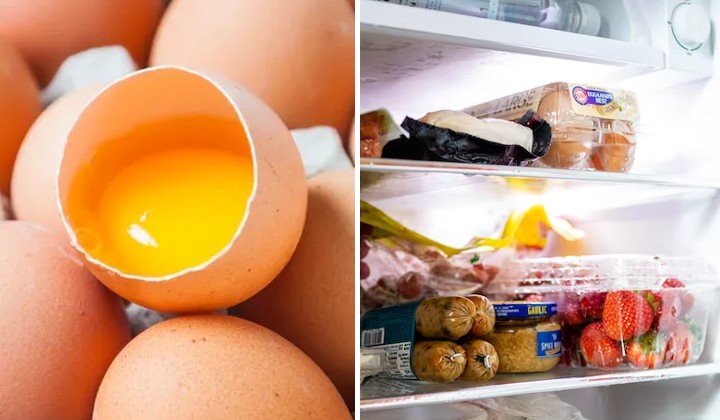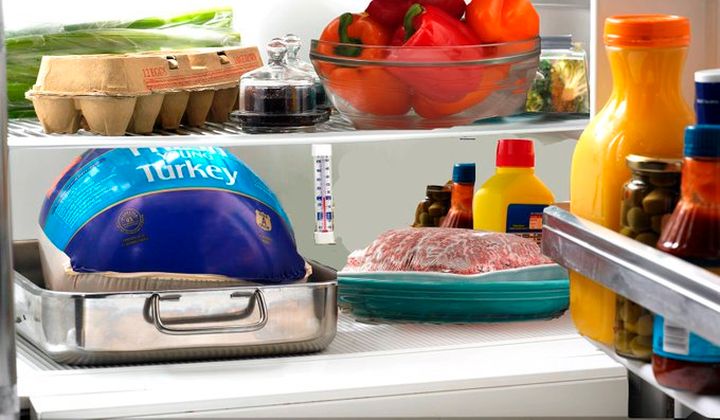Should We Or Should We Not Refrigerate Our Eggs?
You can always store the eggs in the fridge but make sure to store them correctly.

Subscribe to our Telegram channel for the latest stories and updates.
The technical answer lies in where you are.
But before that, you need to know about the ‘bloom’. The bloom or cuticle is an invisible natural protective layer around the egg that keeps the germs away from entering the pores of the eggshell.
So back to the question of whether to be in the fridge or not to be?
Keep them in the fridge
According to Healthline, many countries, especially the US, Australia, Japan and Scandinavian countries require consumers to refrigerate their eggs.
This is because, in those countries, fresh eggs undergo a sterilization process – the eggs are washed in hot, soapy water and sprayed with a disinfectant which kills the bacteria on the shell.
So when the cuticle is gone, it’s up to the temperature to keep the Salmonella and other bacteria growths away. That’s why the eggs there are even sold to consumers in a refrigerated section.
However, they are advised to use the eggs for a maximum of two hours after they’ve gotten the eggs out of the fridge. After that, the risk of bacterial contamination is greater with condensation and the absence of a cuticle.
Keep them outside

However, in European countries, they do not keep eggs in the fridge. This is because they wanna remain the natural cuticle that protects the eggs.
Besides that, some countries like the UK vaccinate their chickens against Salmonella, as reported by Insider. That’s why their sole focus is to preserve the cuticle and get the eggs to consumers fast.
Furthermore, they also wanna avoid the condensation process on the journey back home if eggs are bought from the store-chilled section. Condensation can promote Salmonella growth since bacteria thrive in warm and moist environments.
What about Malaysia though?
But to put it simply, if you’re in Malaysia, you don’t need to put it in the fridge.
Just as you noticed, our eggs at the supermarket are sold in mass quantities at room temperature, not in the chilled section.
So you can store them freely at room temperature. Moreover, some baking experts suggest that room-temperature eggs are best used for baking. They will blend into recipes more consistently, improving your final products.

Nevertheless, is it a fact that eggs stored in the fridge have a longer shelf life than those that are not. Room-temperature eggs can last for around 1 to 3 weeks as long as they’re not washed or refrigerated yet. Refrigerated eggs, however, can last up to 4 to 5 weeks, according to Healthline.
Fun Fact: You could also keep eggs in the freezer for up to a year, given you crack them in a container and keep them safe. How wild is that?
Brian Chau, a food scientist, said that there are no disadvantages to keeping the eggs cold. Eggs in the fridge do no harm, given they’re stored the correct way.
You can’t store eggs in the door section of your fridge (they should’ve told the fridge makers this before they invented the egg section). Yes, it’s an easily accessible spot but keep in mind that those doors open and close regularly, which means the temperature is not controlled.

According to Corrigan Duffy, a chef at Corrie Cooks, eggs should be kept on the middle shelf of your fridge, preferably towards the back because that’s where the temperature is the coolest and most consistent.
So the short answer to the question is yes, you can store your eggs outside. But, if you wanna extend their shelf life, put them in the fridge, in the middle section.
Bonus Fact – Storing your eggs the right way
Actually, there’s also a right or wrong way to store your eggs. Lisa Steele, a chicken keeper from Fresh Eggs Daily, advises the public to store their eggs with the pointy end down.
Besides keeping the yolk centred, another reason for this is there’s an air pocket at the blunt side of the egg. This air pocket may contain bacteria that can seep into the shell. The egg yolk is more perishable compared to the egg white so it needs to be steered away from germs as best as it can.
If you store the egg blunt end down, the air pocket will rise, touch the yolk and risk contaminating it. By storing the eggs blunt end up, the air pocket stays away from the yolk, and the eggs stay fresh longer.
If you wanna know more facts about eggs, read this article below.
READ MORE: Everything You Know About Eggs Are Wrong: 7 Facts You Need To Know
READ MORE: Stop Washing Your Eggs Or You’ll Get Salmonella
Share your thoughts with us via TRP’s Facebook, Twitter, and Instagram.





